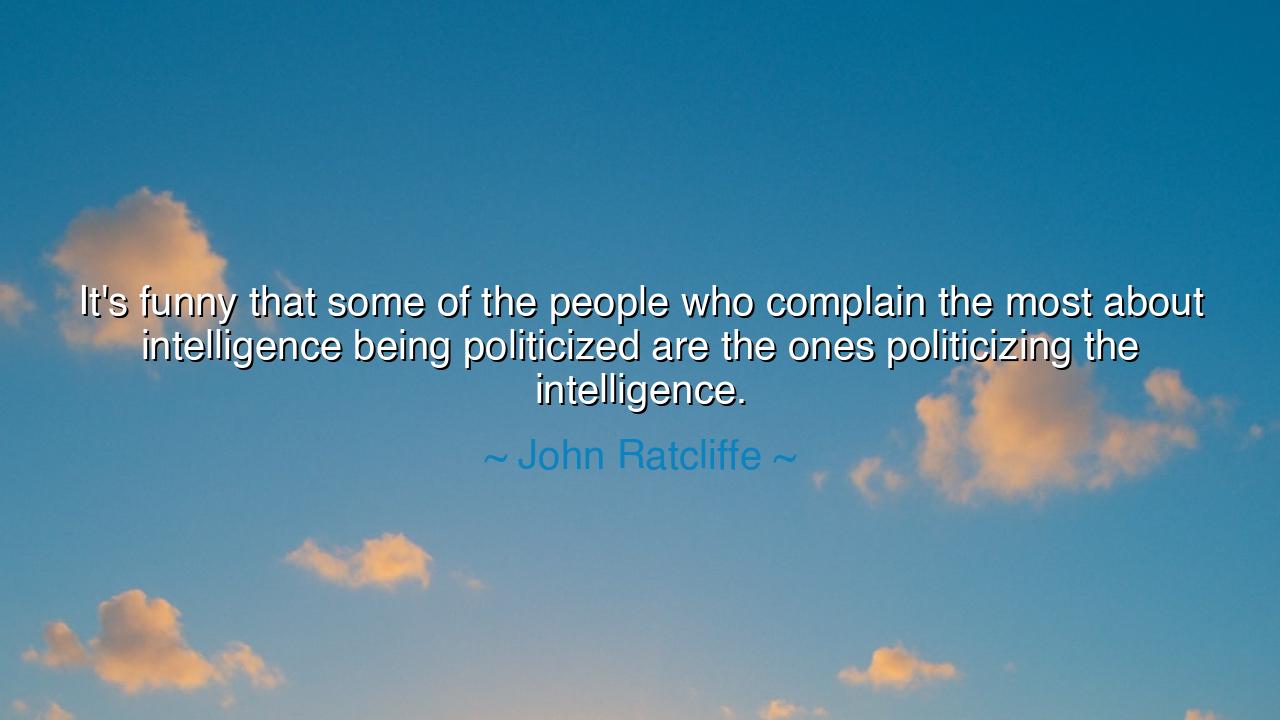
It's funny that some of the people who complain the most about
It's funny that some of the people who complain the most about intelligence being politicized are the ones politicizing the intelligence.






In the sharp words of John Ratcliffe, "It's funny that some of the people who complain the most about intelligence being politicized are the ones politicizing the intelligence," we find a profound reflection on the corruption of truth in the pursuit of power. Ratcliffe points to the paradox of how those who decry the manipulation of intelligence for political gain are often the very individuals responsible for such manipulation. This observation cuts to the heart of a broader issue in modern society: the manipulation of knowledge and facts to serve personal or political agendas. What was once considered objective, rational, and apolitical—intelligence—has now become a tool of partisanship, twisted to fit the needs of the powerful. Ratcliffe’s words serve as a cautionary tale, urging us to examine not just the information presented to us, but the motivations behind it.
The ancients knew well the power of knowledge and the dangers of using it for personal gain. In Plato’s Republic, the philosopher Socrates famously warned against the corrupting influence of power on truth. He argued that those who wielded power—whether kings or statesmen—often distorted truth to suit their purposes, thus compromising the integrity of justice and wisdom. Plato’s ideal society was one where the rulers, the philosopher-kings, were guided by reason and truth, not by political ambition. This vision of a just society was predicated on the idea that knowledge should be used for the common good, not for self-serving purposes. Ratcliffe’s remark about the politicization of intelligence resonates with Plato’s concern: when truth is subordinated to politics, society suffers.
Take, for example, the story of Julius Caesar, the Roman general and statesman whose rise to power was driven in part by his strategic use of information. Caesar’s military campaigns were often shaped by intelligence, and he was skilled in manipulating public opinion to secure his political goals. His famous phrase "Veni, vidi, vici" (I came, I saw, I conquered) is a reflection of his ability to frame his actions in a way that presented them as inevitable victories. Caesar’s manipulation of knowledge—through rhetoric and selective reporting—was a crucial part of his political strategy. However, his actions ultimately led to the decline of the Roman Republic, demonstrating how the distortion of truth for political gain can have devastating consequences for society. Ratcliffe’s words, in this context, remind us that when intelligence is used to serve the interests of the few, rather than the many, it can corrupt the very foundations of governance and justice.
In more recent times, the manipulation of intelligence for political purposes has been evident in countless instances. One of the most notable examples is the use of intelligence in the lead-up to the Iraq War in 2003. The Bush administration presented evidence, some of which was later discredited, that Saddam Hussein possessed weapons of mass destruction (WMDs), framing the invasion as a necessary step to protect global security. Many critics argue that this intelligence was politicized, shaped to fit the administration’s agenda and justify military action. In the years that followed, the lack of WMDs in Iraq led to widespread criticism of how intelligence had been manipulated for political purposes. This example underscores the danger of politicizing intelligence: when truth becomes a tool for advancing personal or national interests, it loses its integrity and can lead to devastating consequences.
The lesson in Ratcliffe’s words is clear: when we allow politics to overshadow truth, we sacrifice the very foundation of trust in our institutions and in each other. Intelligence, whether it comes from military sources, scientific research, or public opinion, must be evaluated on its merits, not its utility for advancing a political agenda. The ancients understood this well: to live a life guided by wisdom and truth is to align oneself with the natural order of the world, to act in ways that are just and honorable, regardless of the personal cost. When we prioritize truth over partisanship, we create a society where the common good can flourish, and where the integrity of knowledge is preserved.
In our own lives, we must remain vigilant against the temptation to manipulate truth for personal or political gain. Whether in public service, business, or personal relationships, we must always seek to align our actions with integrity and honesty, even when it is difficult. Ratcliffe’s warning serves as a reminder that the pursuit of power through the distortion of truth can have far-reaching consequences, not just for individuals, but for the society at large. We must learn to value truth over expediency, and to demand transparency and accountability from those in positions of power.
As individuals, we can also take action to combat the politicization of intelligence by educating ourselves and critically analyzing the information we receive. In a world saturated with information—both true and false—it is more important than ever to cultivate the skills of discernment and critical thinking. Just as Socrates urged his followers to question everything and seek deeper understanding, we must approach the information we encounter with a skeptical eye, asking: is this being presented to us with integrity, or is it shaped by political interests? By doing so, we can ensure that we are not merely passive consumers of information, but active participants in the preservation of truth.






AAdministratorAdministrator
Welcome, honored guests. Please leave a comment, we will respond soon